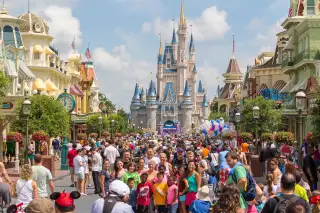What Disney's Big Theme Park Price Changes Are Really All About

Over the weekend, the Walt Disney Company announced some changes to pass prices at theme parks—a topic that never fails to upset park goers.
First, as the Wall Street Journal reported, the company is considering a shift to a dynamic pricing system, in which admissions prices would increase on high-demand days (weekends, holidays, peak school vacation weeks) and be cheaper on slower midweek days.
Dynamic or variable pricing has been discussed for years as an inevitability at theme parks, and it looks like it will be a reality in the near future. What's less clear is what form of dynamic pricing will be pursued: It could be like Uber's "surge pricing" when rates soar during peak demand periods; or like airline fares in that customers would pay different prices based on when they booked; or like ski resorts that have instituted different flat fees for midweek, weekend, and holiday times; or something completely different.
Secondly, Disney simply went with the old reliable strategy of hiking pass prices across the board. The parks already jacked up daily admissions prices earlier this year—entrance to Orlando's Magic Kingdom hit $105—and now the costs of annual passes have also gotten a hefty boost. The Orlando Sentinel listed all the different varieties of seasonal annual passes that just got $60 to $100 more expensive. At Disneyland in California, a new kind of annual pass with no blackout dates was introduced at the unheard-of price of $1,049, while a less-comprehensive pass that allowed for about 350 days of admission—blackouts around Christmas and New Year's—is being priced at $849.
It's not hard to see why Disney would be making these changes. The parks institute price increases year after year, with little to no dropoff in attendance afterward. In fact, park attendance seems to break records with each passing year. The action of tourists essentially gives Disney and Universal the green light to keep jacking up prices in pursuit of higher profits. The potential shift to dynamic pricing is also all about hiking profits and revenues—milking big spenders for more cash on the peak days, while attracting more paying customers through the turnstiles during slower periods.
While profits are undeniably at the heart of these changes, they're also about simple crowd control. If you glance at many of the negative reviews of Walt Disney World or Disneyland at sites like Yelp and TripAdvisor, you'll see that people complain nearly as often about the parks being overcrowded as they do about them being overpriced. Maddening crowds and long lines can make theme park visitors miserable, and the "solution" Disney seems to be settling on is a win-win for the company: Raise prices so high that the parks will be full (but not overfull) of just the right (high-paying) customers.
“We have to look at ways to spread out our attendance throughout the year so we can accommodate demand and avoid bursting at the seams,” Walt Disney Parks and Resorts Chairman Bob Chapek said to the Wall Street Journal, concerning the possibility of dynamic pricing.
As for whether higher pass prices will actually help ease crowds, or perhaps even turn lots of lifelong Disney fans away from the parks, some insiders are skeptical. "Forgive me for not holding my breath waiting for a fan revolt against Disney's latest price increase," Robert Niles, the founder of ThemeParkInsider.com, wrote regarding the changes to annual passes. "Yes, fans are complaining. Some might end up switching their pass levels. Others might have to make cuts elsewhere to support their Disneyland habit. A few might even stop going to the park. But in the end, Disneyland attendance won't suffer from these increases, as it has not suffered from increases in years past."